

With California’s unemployment rate at 11 percent, elected leaders should do everything they can to keep parents working and able to support their families. Instead, Gov. Jerry Brown proposed cuts that would devastate child care, leaving tens of thousands of children without a place to go, and forcing parents out of their jobs.
Communities across the state are speaking out against the cuts and arguing for a smart, fair state budget that protects child care. In San Diego, Oxnard and Santa Maria, children, parents and child care providers rallied in recent days.
I’m one of them. I stand up and speak out because I’m a child care provider in Oxnard and a leader of Child Care Providers United/AFSCME.
I stood with fellow concerned citizens and activists Saturday at the Parquedel Sol in Oxnard to protest the outrageous cuts that would hurt the most vulnerable in our community.
» Read more about: State Cuts Endanger Kids, Communities and Workers »


 In its continuing effort to be as sensationalistic as possible, the Los Angeles Times this Sunday ran what purported to be a big expose on the medical cannabis industry under the heading, “The Green Rush.” Set aside that this sounds like maybe the worst Marvel superhero, or perhaps what happens at an environmentalist frat house. What exactly have they exposed here? That the industry is weakly regulated? That there are too many sketchy players in this industry? That there’s a lot of uncertainty moving forward?
In its continuing effort to be as sensationalistic as possible, the Los Angeles Times this Sunday ran what purported to be a big expose on the medical cannabis industry under the heading, “The Green Rush.” Set aside that this sounds like maybe the worst Marvel superhero, or perhaps what happens at an environmentalist frat house. What exactly have they exposed here? That the industry is weakly regulated? That there are too many sketchy players in this industry? That there’s a lot of uncertainty moving forward?
I’m not really sure that the L.A. Times is the first to point this stuff out, but it’s all true and it does deserve to be said again. The article takes an in-depth look at court records and police records to show that a sizeable chunk of the industry appears to be primarily concerned with profiting off of patients – in apparent violation of 1996’s Compassionate Use Act.
» Read more about: Pot Pharms: Responsible Dispensaries or Roach Motels? »
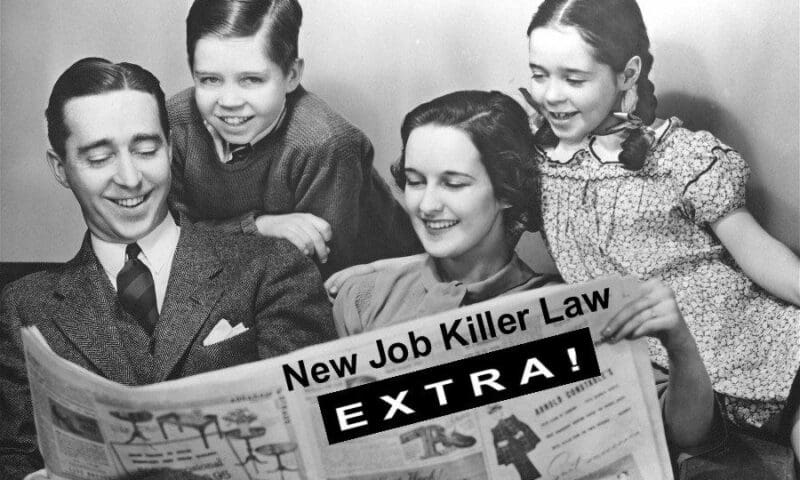
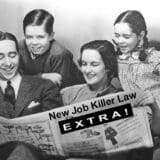
(Editor’s Note: The following executive summary comes from a study partly funded by the Public Welfare Foundation and the Ford Foundation, and is used by permission.)
An independent study released by two prominent scholars found that number of news stories with “job killer” allegations have increased by 1,156 percent between the first three years of the George W. Bush administration and the first three years of the Obama administration.
The study, “Job Killers” in the News: Allegations without Verification, by Professors Peter Dreier of Occidental College and Christopher R. Martin of the University of Northern Iowa, revealed that the “job killer” allegations came most often from Republican and business group sources, and were targeted at policies to safeguard consumers, protect the environment, raise wages, expand health insurance coverage, increase taxes on the wealthy, and make workplaces safer.
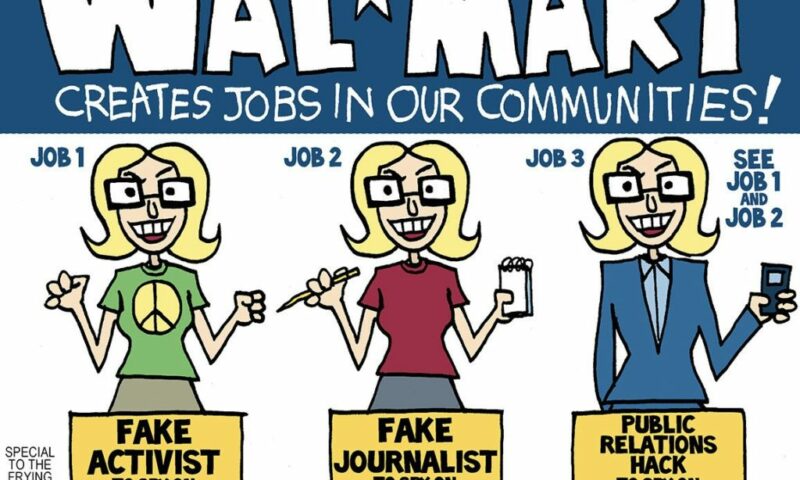
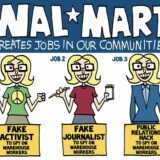
» Read more about: Lalo Alcaraz on Walmart's Fakes and Hacks »
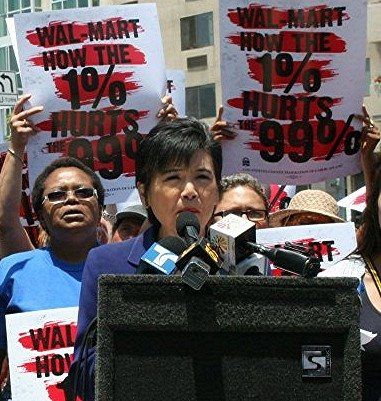

While most media attention this week concerning Walmart’s L.A. expansion plans has understandably focused on the cloak-and-dagger shenanigans of self-confessed corporate spy Stephanie Harnett, the mounting local opposition to Walmart has taken on serious political overtones. At the same news conference at which Secret Agent Harnett revealed her identity, Congresswoman Judy Chu vowed to refuse Walmart campaign contributions and encouraged her colleagues to do the same.
“I have never accepted a dollar of Walmart money and I will never take Walmart money,” Chu told a gathering of reporters on Wednesday. “I call on all Los Angeles elected officials not to take Walmart’s money — and to give it back if they’ve accepted those contributions in the past.”
The June 13 event was held across the street from the Chinatown location where Walmart hopes to open a 33,000-square-foot grocery store. Walmart’s dream is the nightmare of local businesses and Chinatown community leaders,
» Read more about: Judy Chu Tells Politicians: Don't Take Walmart's Money »
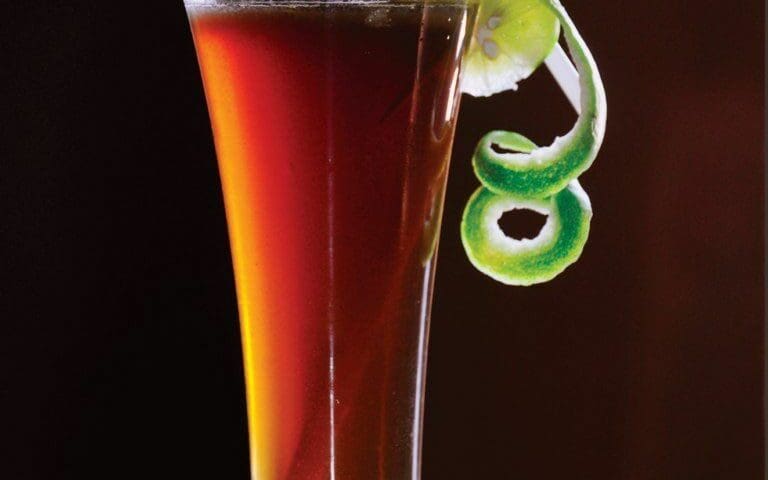
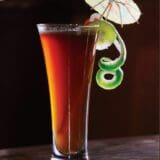
This may be organized labor’s summer of discontent, but don’t tell that to the folks at L.A. Labor 411. The communications group, which for the past five years has supplied Angelenos with directories listing more than 3,000 unionized businesses, goods and services, has been busy compiling socially conscious drinking recipes (mojitos ahoy!), products and venues for those who imbibe. They call one of their standouts the Union Made Long Island Iced Tea – although I’ll bet that Back East it might be known as the Last Exit toBrooklyn. All its ingredients are processed or manufactured by companies where workers enjoy the wage, health-care and vacation benefits of union representation.
Dale DeGroff, the “King of Cocktails” who mixed many a L.I. Iced Tea at New York’s Rainbow Room, places the drink’s birthplace at the Old Beach Inn in Hampton Bays.
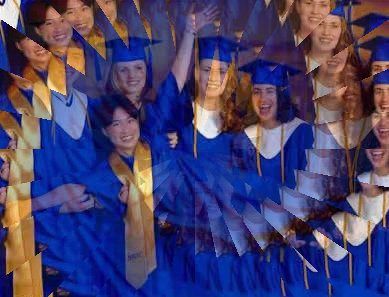

(Update, June 17: A United Teachers L.A. bulletin has announced the 58-42 percent membership approval of the agreement discussed below.)
My neighbor Rena found her life’s work at the age of 50. Today, 10 years later, she could lose that work and her profession teaching English as a second language.Thousands of teachers in L.A. this week are voting on a proposed agreement to reduce their own pay in order to save adult and early childhood education programs, teacher-librarians, counselors and nurses, and to reduce class sizes. It’s a deal that would make most of us blanch – threaten our own family’s economic health for the common good? No thanks.
In fact, by refusing to raise property and other taxes in California, we’ve essentially left it to the teachers to volunteer for the sacrifices the rest of us are not willing to make for the welfare of our state’s public school children.
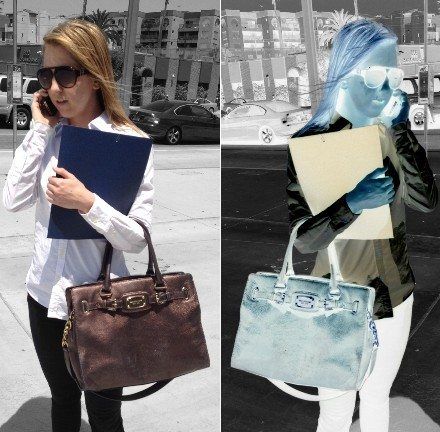

On Wednesday, June 13, Caroline, an organizer at a downtown press conference held by opponents of a proposed Chinatown Walmart store, noticed a young woman chatting to reporters. She’d seen her exactly one week before at another news conference. There, the young woman introduced herself as Zoe Mitchell, said she was a student at the University of Southern California and, somewhat vaguely, mentioned that she was interested in writing human interest stories.
At the June 6 event, Mitchell seemed sympathetic to the cause of workers who had a long list of complaints against the Walmart-contracted warehouses they worked in. And she had a request – could she talk to some of these workers who spoke English and record their names and stories?
Caroline was happy to accommodate the student and hooked her up with a lengthy interview with the worker present who spoke English.
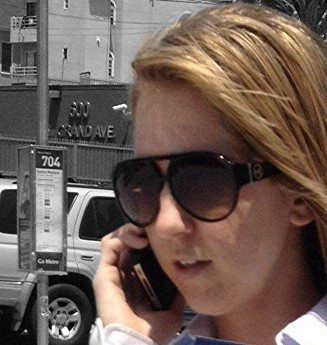

 Who is the woman seen in this photograph talking on a cell phone? Last week she claimed to be “Zoe Mitchell,” a young student at USC interested in the terrible and illegal conditions found inside warehouses that move goods for Walmart. She told warehouse workers she was a journalist interested in their plight. (See her business card and last week’s event sign-in information below. Click to enlarge the image.)
Who is the woman seen in this photograph talking on a cell phone? Last week she claimed to be “Zoe Mitchell,” a young student at USC interested in the terrible and illegal conditions found inside warehouses that move goods for Walmart. She told warehouse workers she was a journalist interested in their plight. (See her business card and last week’s event sign-in information below. Click to enlarge the image.)
Today, while gathering information at a news conference held by community and labor groups opposed to the retail giant’s entry into Chinatown, she let her true identity slip. “Zoe Mitchell” is completely fictional. Zoe is actually Stephanie Harnett, a fake “reporter” working for Walmart — more precisely, a senior associate at Mercury, a giant PR firm that represents a wide range of corporate interests. Mercury says it is about “high stakes public strategy” and boasts that it is especially adept at “Latino Communications.”
The big question is,


It’s a strange feeling to recognize someone not by his or her face, but by their name-tag. This was the experience I had in Providence, Rhode Island this past week, where I attended the annual Netroots Nation conference for progressives on behalf of my union, UNITE HERE Local 11. It was good to finally match up the tweets to all these faces that I had been in touch with for the past year.
I arrived at the conference later than most of my UNITE HERE comrades because of my work schedule and a delayed flight. One of the moments that I was sad to have missed was when hotel workers from the Providence Westin came onstage and thanked the Netroots organization for moving its 2010 conference from their hotel due to a contract dispute with the Westin over wage cuts, slashes in vacation and the elimination of union jobs for subcontracted ones.